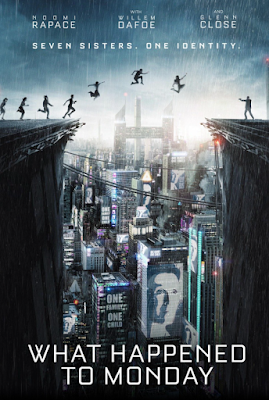What Happened to Monday (TV movie REVIEW) -- What Happens in a Future with Too Many People
A recent entry in the
dystopian sci-fi thriller arena--with undertones of “Logan’s Run”, a bit of “Blade
Runner”, and, borrowing most heavily from “Orphan Black”--Netflix’s “What
Happened to Monday?” turns out to be a pleasant surprise.
The quandary for government
and scientists: How to deal with an epic food shortage for a massive population
explosion… just bio-engineer more food, right? Yeah, bad plan. Mucking around
in Mother Nature’s genetic pool always seems to lead to unexpected hinky-ness
in the consumers of all that not-so-natural food, and in this case, causes an
epidemic of multiple births… basically the exact opposite of how to solve a burgeoning population. So, part two of
the brilliant plan (with Glenn Close playing the role of mastermind at the sci-tech
conglomerate responsible for solving the problem)? Cryogenically freeze any
additional babies from multiple births, so every family has but one child.
Problem solved!
Until, of course, some family
decides to buck the system… as one grieving father (Willem Dafoe) does when he conspires
with a sympathetic doctor to save the seven grandbabies left in his care when
his daughter dies in childbirth.
What follows next is a little
time capsule, showing how the ingenious grandpa modifies their home—and designs
their very lives—so that the girls won’t be found out. Basically, he decides
there’s one little girl for every day of the week… so each girl is named after
a day, and is allowed to go outside and be “Karen Settman” on her day, while
the rest stay indoors, hidden, until their days pop up each week. (It is a
solution both clever and far-fetched, but of course the thought of freezing
newborns is untenable, so we have little trouble putting ourselves in his shoes
and buying into the scheme.)
Cut to the present, when the
sisters (played by Noomi Rapace) are 30ish, and we see what it looks like for
seven adult women to still be perpetuating the ruse. (Yeah, the lack of freedom
and monotony six out of seven days is grating on them, to varying degrees, as you
might expect.) At home, they can be themselves… but they’re trapped at home,
unable to develop serious friendships or relationships with anyone outside the
confines of their large loft apartment.
Then one day, something
happens. The always-reliable Monday doesn’t return home from the bank where “Karen”
has a job… throwing the other six sisters into a major tizzy. What to do? Two
women can’t be out in the world being “Karen” at the same time—especially not
since everyone is kept track of via wristbands that are scanned at various
entry points—and yet at least one of them has to venture out, if they’re ever
going to find out what, exactly, did happen
to Monday.
Although parts of “Monday”
are admittedly a bit thin—for instance, we’re only shown Close’s company, as
though hers is the only one responsible for all the cryogenics—there is much to
enjoy here… particularly Rapace’s skillful performance(s) as the seven adult
sisters. There’s nowhere near the time for her to fully develop their
personalities in a two-hour film—unlike that afforded the brilliant Tatiana
Maslany in the five-season TV show “Orphan Black”—but she makes the most of it,
leaving us with a sense of who each woman is, and how each one is (or isn’t)
coping with the challenges inherent in being allowed to interact with the
outside world only one-seventh of every week (month, year, decade).
The premise of the movie is
also a fascinating one—and timely, given how many of the poorest nations in
the world have long faced the dual problems of overpopulation and food
shortages/starvation. The solution in “Monday” is, undoubtedly, an extreme one,
but discussions can certainly be had about how we as a world might deal with
the same issues.
~GlamKitty



Thanks for post:
ReplyDeletebinh giu nhiet trung quoc
phu tung xe may trung quoc
den ban taobao gia re
ship cap toc toi palau